Okay, picture the scene: it’s a Saturday afternoon in mid-June and there’s about 150 of us on the ground floor of a low income housing building on the Lower East Side of Manhattan. During the week the space is used as a PROS program through an agency called Community Access, but today it has been taken over by a new organization holding their founding event: the Institute for the Development of Human Arts (IDHA) who is hosting “Making New Meaning: A School for Innovative Voices & Visions.” IDHA defines itself as “a radical mental health initiative that brings together like-minded clinicians, peers, and mental health workers who are dedicated to exploring the links between personal and societal transformation.” They are determined, in their own words, to “create and strengthen communities of practice around transformative mental health care” and “encourage professionals and non-professional community members alike to explore multiple perspectives, always prioritizing the agency of individuals and communities.” So what does this new project look like on the ground?
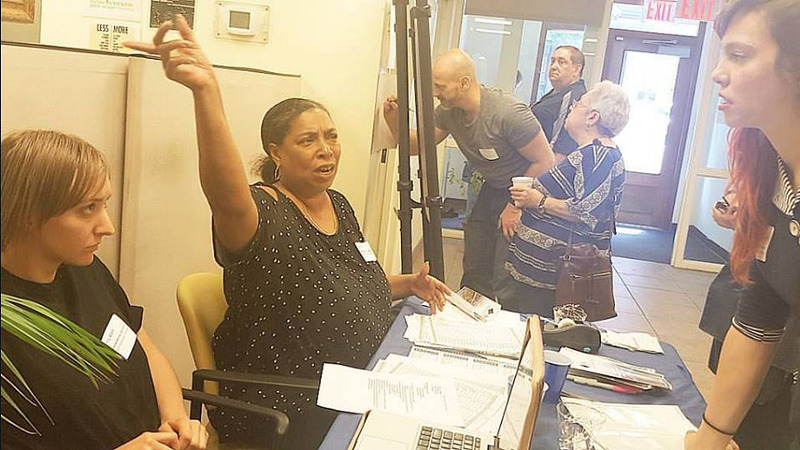
Well, I’ll give you my perspective as someone who’s been around the mad movement for a few years and has recently been working on both sides of the non-professional and professional worlds. I was at some of the initial IDHA organizing meetings but I didn’t help organize this event, so all these opinions and perspectives are my own, not IDHA’s. First of all, on Saturday I walked in the door and was immediately greeted by Celia Brown, who was one of the original Peer Specialists back in the early ’90s and now works Bureau of Recipient Affairs at the Office of Mental Health. She was there at the front desk with Emily Allan, who’s a young creative neighborhood artist and NYC Icarus Project member. I thought I was getting there on time but the place was already packed with people.
As I made my way through the crowd, seeing some old familiar faces and a bunch of new ones, it reminded me a bit of the event a few weeks ago when we showed the film CRAZYWISE and there was a mix of folks from the community: folks who use the services of the system, folks who are working in that system and folks who are just looking for connection from likeminded souls. These days I spend way more time on social media than I do in rooms full of actual people and it feels so good to be in rooms full of actual people, some of whom I only ever see on the screen!
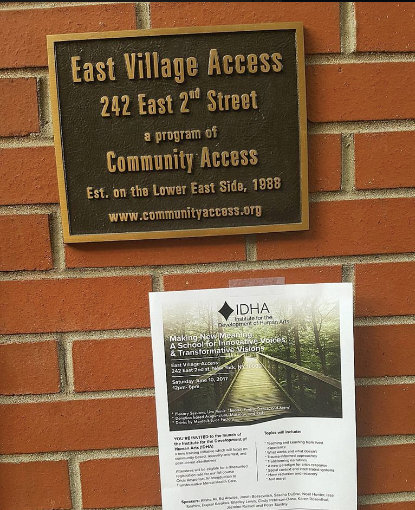
There was a lot happening in the space: there was a main hall with panels and performances, there was a room where people were getting acupuncture and massages and Reiki, there was a room just to chill out, there was a big open space where people were talking and eating food, and then there was a scene of folks hanging out outside on the street. I walked into the main hall and there were at least 100 people sitting there watching the first panel.
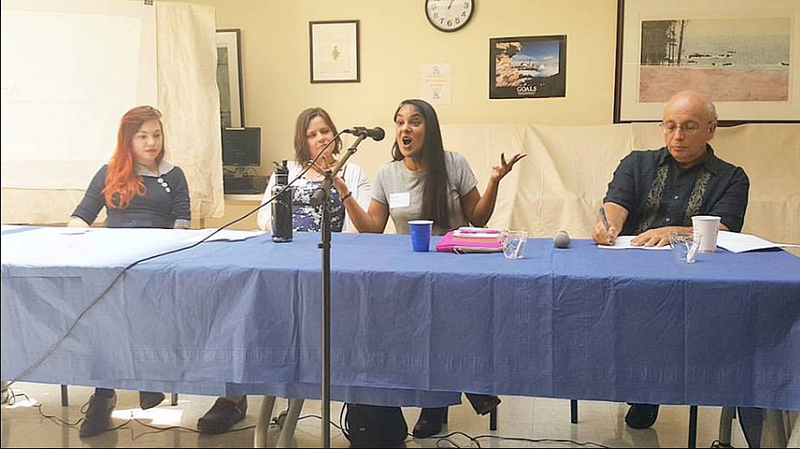
I took a seat just as Jazmine Russell was talking about her vision of mutual aid and community building practices, and how her history of child sexual abuse has informed the way she thinks about the changes that need to happen in the mental health system. She has a degree in Applied Psychology and these days works as a Peer Specialist on a mobile treatment team in Queens. As one of the main faces of IDHA, Jazmine’s humble bravery and spiritual practice lends a lot of credibility and grounding to the group.
Alisha Ali speaks next. As an Associate Professor in the Department of Applied Psychology at NYU her research focuses on the mental health effects of oppression including violence, racism, discrimination and trauma. In the system she’s best known for her studies on “depression” which she swiftly puts quotes around. “That’s the language we have to use in the system but we know it’s not about biology, it’s about social context.” Alisha describes a program she researched that proved economic loans in the community did more for individuals than antidepressants. She’s in the academy laying the ideological foundations for a new model of care, a model that is fought against vehemently by the forces of big business and biological psychiatry. As a mother and a Muslim woman who’s not a US citizen, she knows how important it is that we build a movement where the most marginalized are centered. “It’s through the acknowledgment of our differences that we discover our common humanity, but we need to be able to talk concretely about oppression or the work will never get done well.”
Noel Hunter speaks after Alisha, a fiery clinical psychologist whose work focuses on the link between trauma and altered states, human rights, and alternative approaches to healing. She recently got a book deal with Palgrave Macmillan for a book entitled Trauma and Madness in Mental Health Services. Like Alisha, she talks explicitly about the connections between oppression and mental health. “Who here has heard of the ACE’s study?” she asks the crowd. A bunch of hands go up. In recent years the Adverse Childhood Experiences Study has shown that many physical and mental health issues are directly correlated to early exposure to physical and sexual and emotional abuse, emotional neglect, seeing mothers treated violently, household substance abuse, household mental illness, parental separation or divorce, or having an incarcerated household member. “We just can’t talk about mental health in an economic or social vacuum. We need to talk about systemic oppression. That’s why we’re here creating something new.”
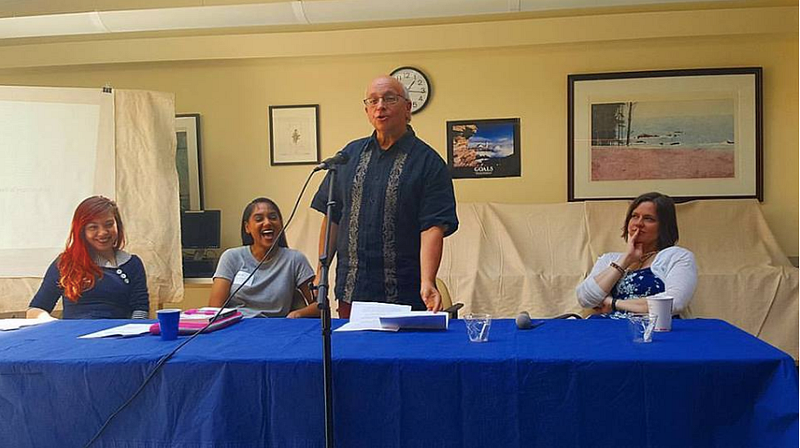
Peter Stastny finishes the first panel. As the elder of the group, he’s the self-chosen, pragmatic voice of “What works and what doesn’t work,” having been around and active since the 1980s and watched so many progressive mental health projects become defunded or co-opted or simply slip into obscurity. It’s obvious he wants this project to have a different fate. For a self-proclaimed radical, Peter brings a sense of institutional legitimacy to the group, and three decades of connections to people inside the system count for a lot. Many of the older people in the audience are there because they know Peter and respect his work. He was right there in the Bronx in the early 90’s with Celia when they were developing the first Peer Specialist program. He was one of the founding members of INTAR (International Network Toward Alternatives and Recovery), which has created a network of clinicians all over the globe who are dedicated to transforming the mental health system. He’s all about using whatever power he has to support and raise up the voices of psychiatric survivors and creating alternatives. And this project is clearly close to his heart.
Delicate Ecology of Arts and Radical Mental Health and Riff-Raff
So that was how the day started, and went on until the late afternoon: a mix of more panel discussions and then amazing performers—musicians and poets and even a comedy troupe. Young trans mixed-race badass Nikomeh Anderson got up in front of everyone and performed “The Dystopia of Normalcy” about race and gender and identity, putting themselves out there with their huge heart. Issa Ibrahim, the author of The Hospital Always Wins, played his songs about being locked up in Creedmoor Psychiatric Hospital for two decades and blew away the crowd with his realness. Rebecca Stabile sang her anthem “Crazy People” and a bunch of other songs that brought us all together.
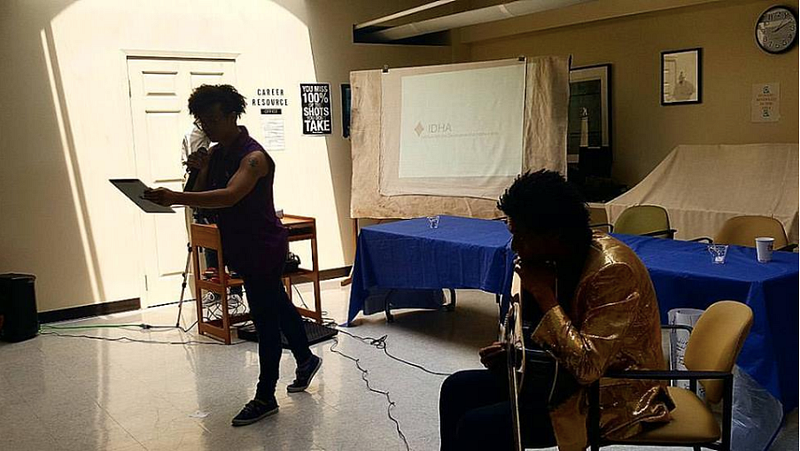
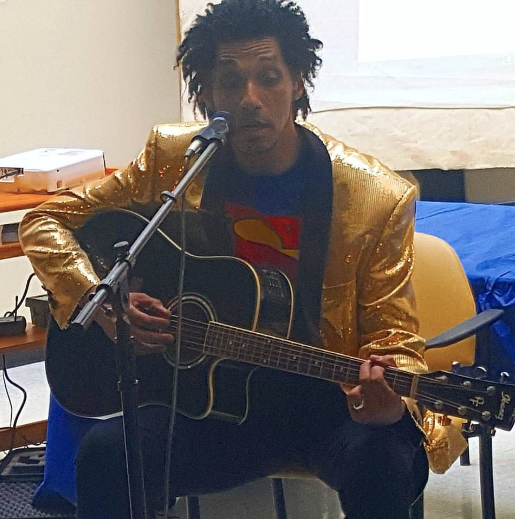
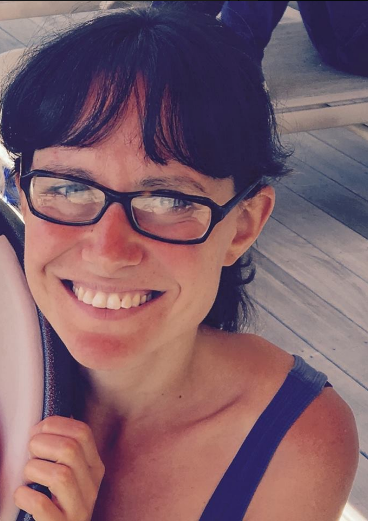
The folks hanging out outside the conference played an important role in the dedicated ecology of our growing movement. Daniel Mackler, former therapist turned film maker and now riff-raff world traveler, laughs and says to me: “Yeah these days I don’t have the patience to sit there and listen to people on panels talking about mental health. I’d rather sit out here and play guitar and talk to strangers.” Another outspoken Peer Specialist who works in the system says to me: “How can you even stand sitting in that room? I’d never make it through college if it was like that. A bunch of people just talking and talking…”
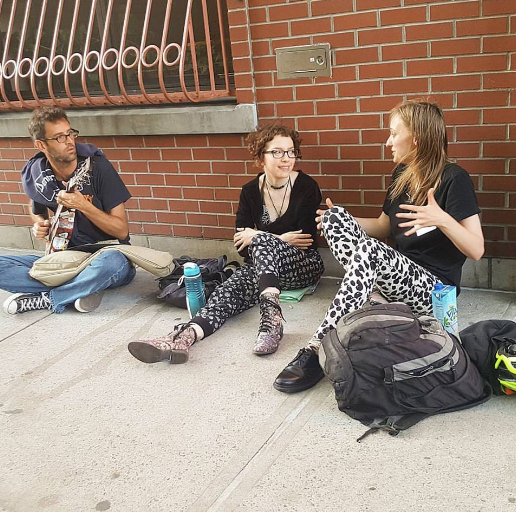
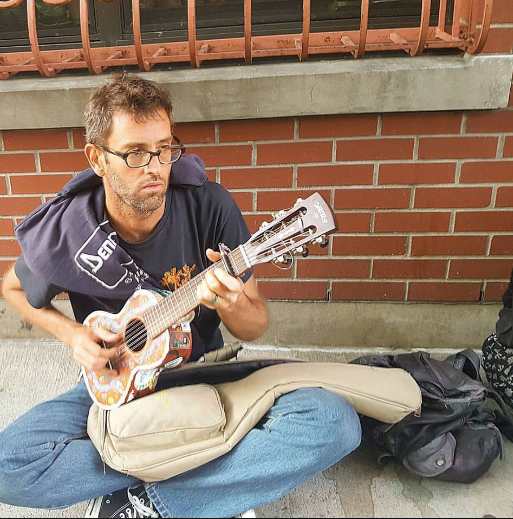
There was plenty of conversation happening outside the conference room. There was a whole crew of folks who came together from the Philadelphia Icarus Project chapter. One of them says to me: “We’ve been having meetings regularly for a year and we’ve learned some things that might be worth sharing with other groups.” I see them hanging out with the folks from the NYC Icarus local. I meet one of the Peer Specialists from the program I work on in the system who’s come all the way from Westchester. I see my friend I’m usually only talking to on social media and it’s nice to put a face to text. I see Steve Coe there the whole day, the executive director of Community Access, who blends right in with everyone else.
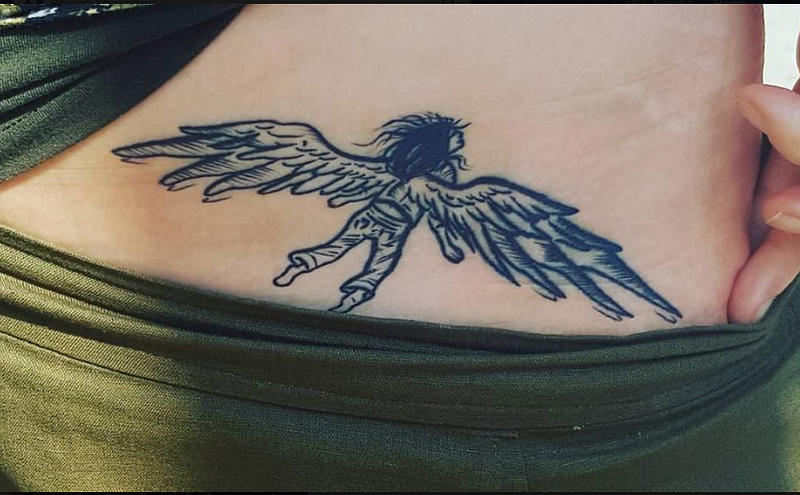
The Confluence of Movements
Part of the beauty of IDHA is that it rests at the confluence of multiple movements and generations and there are some super talented and passionate people involved in the mix.
When Cindy-Peterson-Dana got up in front of everyone and told the story of her teenage son coming through what could be called a two-week episode of psychosis we were on the edge of our seats. Cindy herself had been hospitalized as a teenager, became a clinician in the 80s and then came out as a peer in the early 90s after being inspired by others like Celia Brown and Howie the Harp. She knew that there were other ways to deal with her son’s extreme state. Her family was able to set up a home respite and use a dialogic approach with a few nights of sleep meds to come through her son’s experience without hospitalization. Having a mother who is familiar with things like Open Dialogue, is a fierce advocate for her son, and happens to be the Vice-President for Peer and Recovery Support Services for the Mental Health Association of Westchester is an incredible asset to the group.
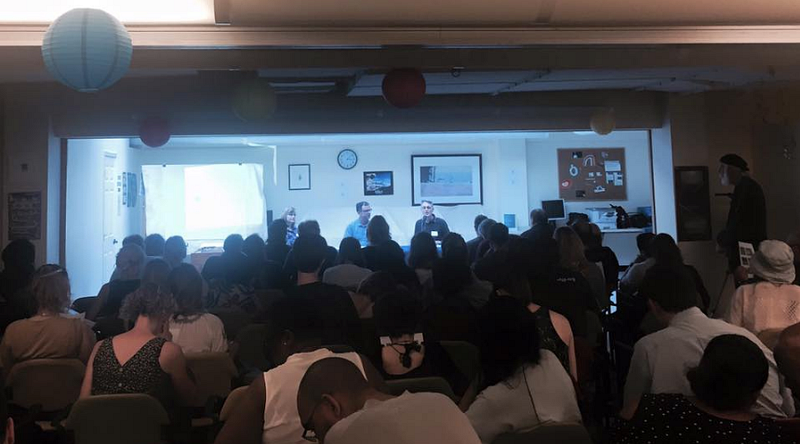
Ed Altwies, the program director for the Parachute Mobile Treatment Team in Queens is another member of the group who brings so much to the table after years of experience practicing Open Dialogue with hundreds of families. He told the story of what it was like for him as a young clinical psychologist entering the public mental health system and what a horrible and dehumanizing process clinicians have to go through to earn their stripes. I couldn’t help but wonder what some of the members of the audience who are recipients of care thought about histories; if they shed some light on why the system is so broken.
Bradley Lewis is another gift to the community. A psychiatrist who went back to school to get a PhD studying Foucault in order to make sense of his profession, and then spent years articulately dismantling the biopsychiatric framework in favor of a plurality of voices and visions. Brad gave a talk on the power of narrative strategies and what the arts and humanities bring to the healing professions. He talked about the capacity to tolerate uncertainty and the movement language of “Nothing About Us Without Us.”
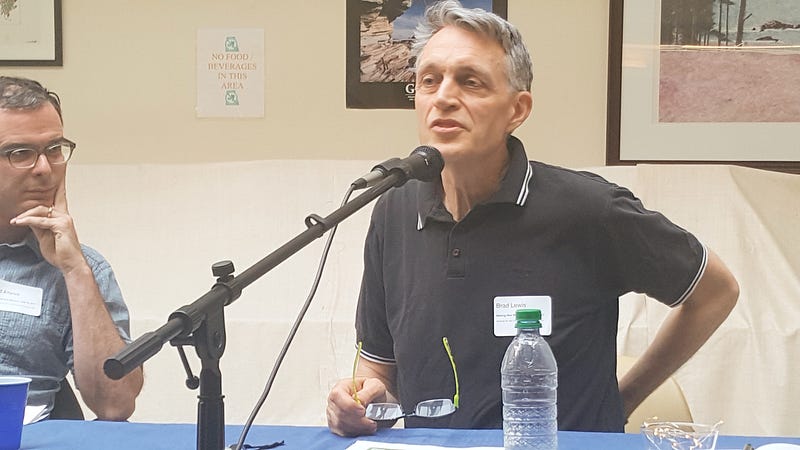
So all those people are really great but if you really want to know the story of where IDHA comes from I could probably shed some light on it.
As far as I can tell, the birth of IDHA can be traced to one night a little more than a year ago when Peter met Jazmine at a NYC Icarus event at Bluestockings Bookstore on Allen St. Jazmine, in her early 20s, was leading a discussion with a room full of young activists about the power of Crisis Plans and Mad Maps and advanced directives to rally support and build community. Peter had a history of trying to use psychiatric advanced directives in the system and they got to sharing stories.
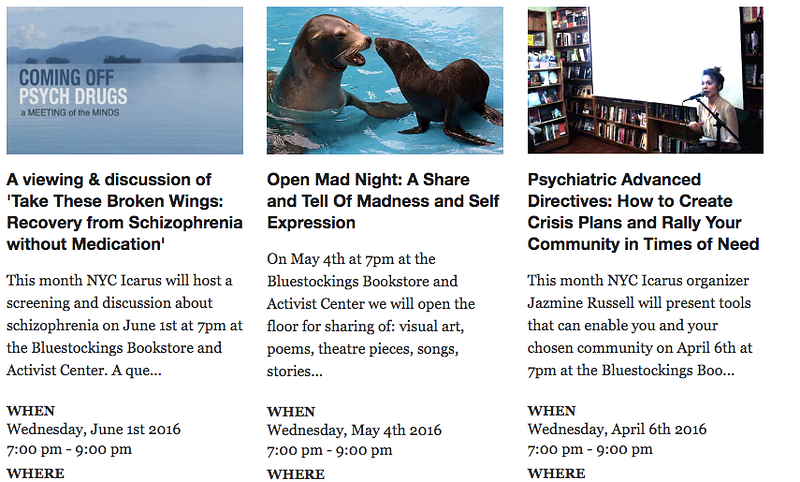
I wasn’t paying attention to what happened but the next thing I knew I got invited to a planning meeting for starting a new organization. The food at the first meeting was good so I came back. And so did a few more people. And from there it grew: monthly meetings in Peter’s psychiatry office in Chelsea, a small cast of characters — artists, visionaries, people working in the mental health system, people using the system’s services, people trying to stay the hell away from the system’s services but needing support and wanting community.
I was struck by the commitment and vision of the people in the room. Sarah Quinter was a young activist and artist who had cut her teeth as a teenager in the last days of the squatters movement in the Bronx and was now working in a multi-racial coalition to fight against the gentrification of her neighborhood in Bushwick, Brooklyn. She came to a meeting and made it clear to Peter and everyone else that if the project was going to be relevant it had to have a clear analysis around oppression and center the perspectives of economically and socially marginalized folks. She herself was barely surviving, struggling with poverty and a personal legacy of childhood abuse that she was in the middle of coming to terms with. Jaz and Sarah and Peter worked together on the initial IDHA proposal. With the help of some connected friends they raised some seed money with an idea for developing the organizational infrastructure for a training institute and some initial classes.
A year of meetings later we were all here at this kickoff event.
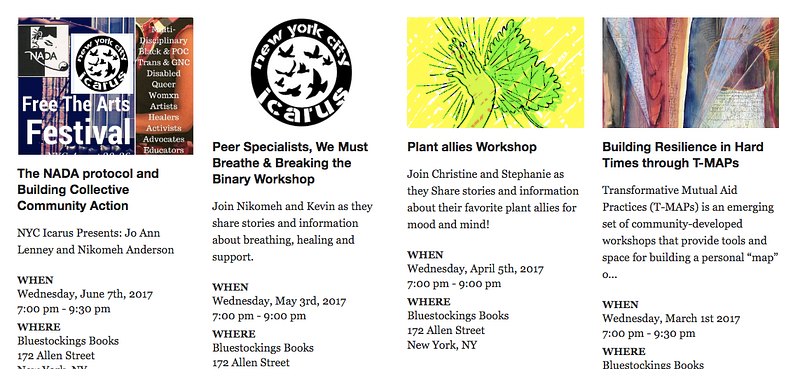
The Mad Underground Rises to the Surface
I think it was Jonah Bossewitch who said it straight up when it was his turn to speak: what was happening at this event was something different than the historic Consumer/Survivor/Ex-Patient Movement. Projects like IDHA represent a new wave of resistance that is less about human rights and individual choice and more about the insistence on full-fledged participation in our own healing, and more importantly, in healing by and through community. There’s also something about the collaboration between people working on the ground and people in the academy, collaboration between Peer Specialists and conscious clinicians, collaboration between artist movements and mental health activists. Jonah used the language of the “Mad Underground” to talk about grassroots groups like The Icarus Project that focus their attention on building alternatives and creating space for dialogue. Karen Rosenthal & Duysal Karakus, trainers from Community Access, talked about the Harm Reduction Movement and the need for the people who are struggling themselves to be at the forefront of the movement.
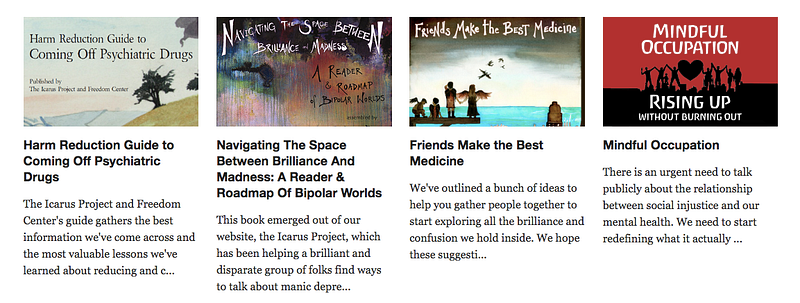
Epilogue: Intergenerational Transmissions and Visions for the Future
Hours after the event officially ends there are still a group of us eating and drinking at a nearby restaurant. A small crew, but we’re representing three generations of activists. Laurie Ahern is the elder: a co-founder of the National Empowerment Center, she’s now the director of Disability Rights International. She’s full of wild stories. One of them goes something like this:
“We started the Alternatives Conference in 1985. Then there was the time NAMI National called me and Dan Fisher into their office and straight up told us that if we kept talking about Recovery from mental illness our funding was going to get cut. And basically we told them to go fuck themselves. And then our funding got cut. But there was enough of a movement resistance that people put pressure in the right places and the next year the Alternatives Conference kept happening.”
I’d never heard that story. The Icarus crew in New York City are mostly millenials, some folks like me that are somewhere in between, not so many older folks. Laurie’s talking about the power of hope. About how necessary our stories are to tell and be proud of. She’s giving us a lot of props for our bravery and doing the work we’re doing and also talking abut how her generation pushed the language of Recovery and how important that was to get us where we are today.
Jonah says: “But Recovery has the language of illness embedded in it, that’s why it works for the system. You have to be sick to recover.”
Laurie replies passionately: “Recovery was never about recovering from an illness, it’s about recovering from the label of illness, it’s about recovering from having your freedom taken away, about not being able to make decisions for yourself because you’re considered incompetent. It’s recovering from having your life stripped away from you.”
Sarah says: “But what about when you’re so young and you’ve never been considered competent to begin with? What are you recovering from then? I like the language of
‘transformation’ better than recovery. I’m not trying to ‘recover’ something I’ve lost, I’m trying to figure out how to grow into what I want to be.”
It’s a conversation happening a lot these days.
I’m grateful for the intergenerational transmissions and the camaraderie of this next generation of the movement. I’m inspired by all the hard working characters behind the scenes who tangibly make me feel less alone in the world. I’m happy to be around people who disagree, as long as we agree on the important stuff. Like Alisha Ali says, it’s through the acknowledgment of our differences that we discover our common humanity, but we need to be able to talk concretely about oppression or the work will never get done well. This group of people is determined to learn from the mistakes of the past and build the foundations for a movement that can take the pressure the future is surely going to dish out.
If you want to learn more about the Institute for the Development of Human Arts check out their website here.
If you want to contact them or donate to them here’s the way to do it.
If you want to sign up for their first series of courses that begin in the fall do it here.
Mad love as the Summer hits the city. We’re here! We’re growing! Nothing About Us Without Us!






